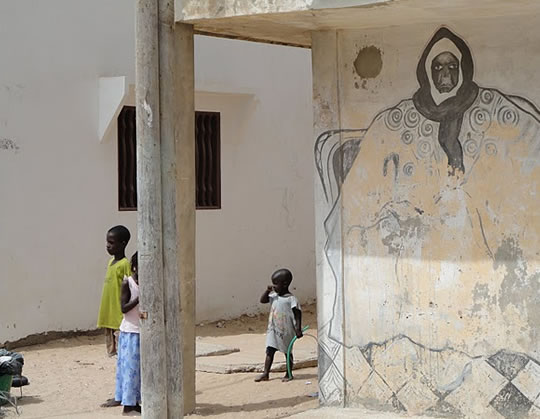Senegal Overview

Family and Community Life
by Stephanie Higdon in collaboration with Mrs. Fatou Kandji
Pre-Islam
Even before Islam spread to a majority of the nation in the 1900's, polygamy was prevalent. Most marriages were arranged (and forced) by parents before a child's birth. Marriages were seen as social contracts and intended to remain within the extended family. Cousins were often married. Even if a mate was not chosen at birth, parents still had the right to choose when the child arrived at marrying age.
Islamic Revolution
Islam was seen as a revolutionary force upon the institution of marriage because it gave specifics on how this tradition was to be organized and carried out. For example, The Q'uran affirmed that the man is the head of the household and is the main economic support of the family. The changes came about when the text dictated that a man can only have a maximum of four wives, and that even the second wife cannot be taken unless he has the capability to financially support her and her children. Marriage was a sign of social status, especially because bachelors cannot lead prayer at the mosque. At a certain age, an unmarried man was seen as impotent. Unwed women were (and sometimes still are) viewed as a temptation and a danger to society. They were not respected even if they were economically independent. Islam also stated that a Muslim can only marry another Muslim.
Developing Modernity
Because The Q'uran states that the man must care for the women in the family, inheritances are always handed down through the men. Just as husbands must care for wives, brothers must care for unmarried sisters. Also, according to Islamic law which still applies today, a man's mother took precedence over anyone else. In fact, most marital disputes arose over this allegiance. Divorce was and is always the last recourse in Senegalese society. To settle any disagreement, societal norms dictate the steps that must be taken. First, the husband and wife talk to each other's families and their own parents and try to resolve the problem on this level. If this is not satisfactory, religious community leaders, Imams, are spoken with. Then the spouses begin to impose restrictions on one another, such as the wife disallowing the husband to eat the food she prepares. They will deny each other sex, move back in with their families and even refund the dowry paid at marriage. In many cases the husband will even resort to physical violence. Unfortunately, the situation often must escalate to this point before a divorce is granted. With globalization's effects, some families can take the matter to the legal courts. The courts may hear the problem, give advice, and ask them to return in a month with an update. Much more like a Western model of separation and divorce, the courts do not usually refund dowrys but do set up alimony payments. However, in Senegal the children typically go with the father. It is important to note, though, that neither processes of legal divorce or consulting community members are common. More often that not, the spouses simply stay in broken marriages . Feminism is on a clandestine rise in Senegal . There have been some street demonstrations and public speaking by feminists. However, polygamy is still quite common, even among intellectuals, out of the shame associated within the religion of being unwed. Feminist groups exist but are not always visible. All evil things tend to be blamed on feminism. This reaction is linked to the Family Code written in 1972. The code regulates marriage, the previously mentioned divorce proceedings, and custody. It did create gains for society, as it states that forced or arranged marriages are no longer mandatory and required registration for new marriages. However, its nature is not entirely revolutionary. It gives the option of choosing to be monogamous, limited polygamous or polygamous (up to four wives), but this choice is only available for men. The Republic of Senegal 's Ministry of Women and the Family wrote a report in 1993 called "Senegalese Women by the Year 2015" [Note]. The report describes the effects of the Family Code, which it claims "liberates and discriminates". "[I]t has not abolished polygamy, the bride price, the unequal opportunity of an heritage, the choice of the man as head of the family and the predominance of paternal authority". It reminds us that women "perform 80% of agricultural work with 12 to 15-hour working days" for free. The Ministry also states that the governments supposed attempt at running pro-women's programs has been undermined by the International Monetary Fund and the World Bank. These organizations have given the Senegalese government a large loan for development but require such hefty payments that social services have been cut.
Limited Freedoms
Men no longer are required to be the sole economic support of the family. With the (partial) emergence of Women's Literacy Projects, many more women are bringing in their share of the household money. This does not, however, imply that they suddenly are sharing more of the decision making power. In fact, women the author interviewed said that their increased knowledge of functional math and literacy has only increased the amount of work they have because now they can run their own shops in the market in addition to the same amount of household burden and child-rearing. However this changing role is challenging masculinity and there is a backlash to this rising independence among women, similar to the one experienced here in the United States . Men are claiming the fundamental Islamic tradition that permits them to retain power in the family.
Reference
Republique du Senegal Ministre de la Femme de l'Enfant et de la Famille. "Senegalese Women by the Year 2015" Dakar, Senegal, July 1993.